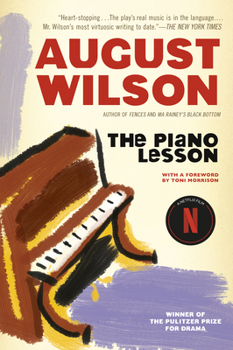Book Overview
NOW A NETFLIX FILM STARRING SAMUEL L. JACKSON Winner of the New York Drama Critics Circle Award for Best Play, this modern American classic is about family, and the legacy of slavery in America. August Wilson has already given the American theater such spell-binding plays about the black experience in 20th-century America as Ma Rainey's Black Bottom, Joe Turner's Come and Gone, and the Pulitzer Prize-winning Fences. In his second Pulitzer Prize-winner, The Piano Lesson, Wilson has fashioned perhaps his most haunting and dramatic work. At the heart of the play stands the ornately carved upright piano which, as the Charles family's prized, hard-won possession, has been gathering dust in the parlor of Berniece Charles's Pittsburgh home. When Boy Willie, Berniece's exuberant brother, bursts into her life with his dream of buying the same Mississippi land that his family had worked as slaves, he plans to sell their antique piano for the hard cash he needs to stake his future. But Berniece refuses to sell, clinging to the piano as a reminder of the history that is their family legacy. This dilemma is the real "piano lesson," reminding us that blacks are often deprived both of the symbols of their past and of opportunity in the present.
Format:Paperback
Language:English
ISBN:0452265347
ISBN13:9780452265349
Release Date:December 1990
Publisher:Plume Books
Length:144 Pages
Weight:0.35 lbs.
Dimensions:0.4" x 5.2" x 7.9"
Age Range:18 years and up
Grade Range:Postsecondary and higher
The Piano Lesson Mentions in Our Blog

Broadway Books
Published by Ashly Moore Sheldon • May 30, 2023
The 2023 Tony Awards are coming up in just a few weeks! To get ready, we have put together a reading list of sorts. With behind-the-scenes reporting, Broadway history, and some of the nominated plays themselves, these titles cover a lot of ground with books perfect for new theater fans and seasoned experts.













